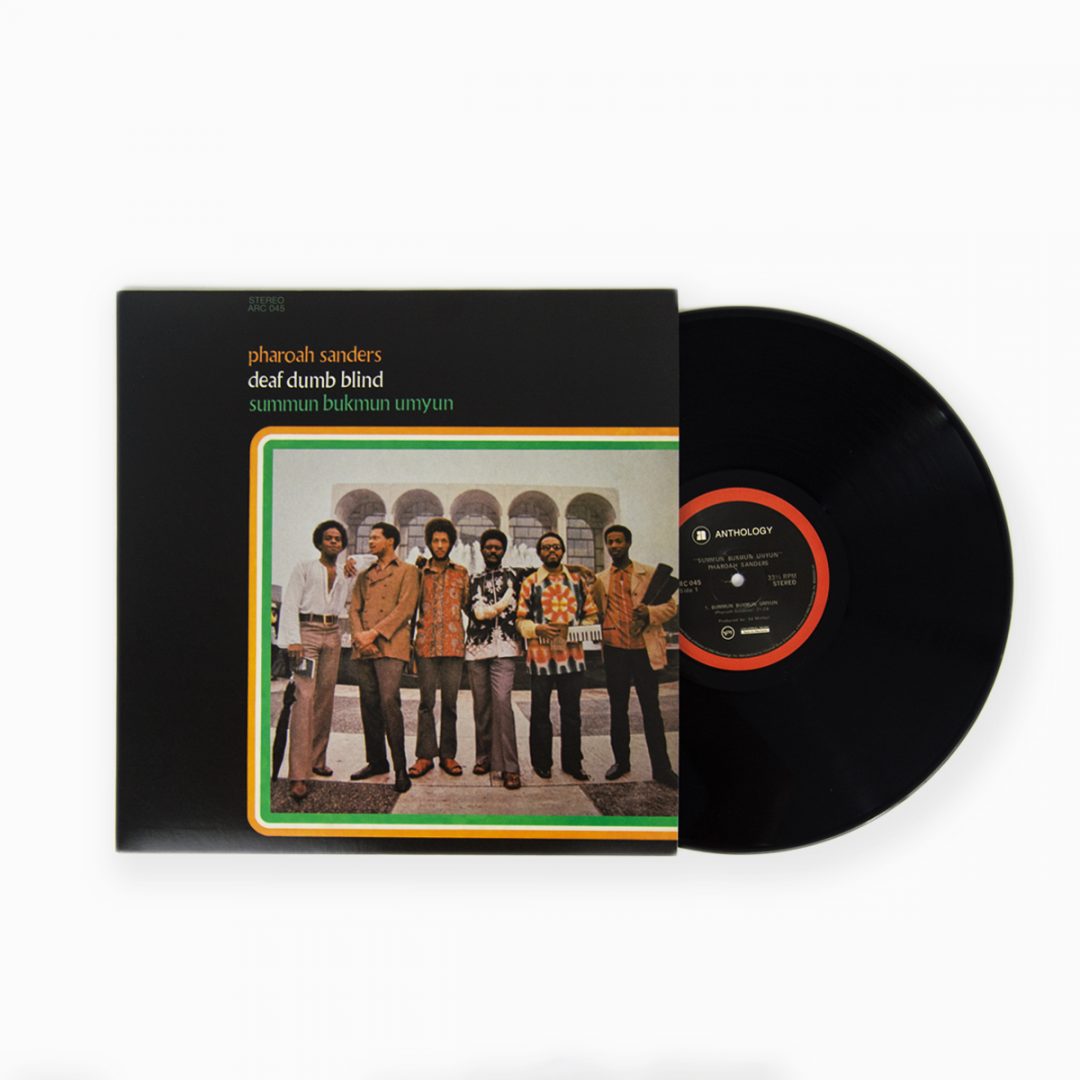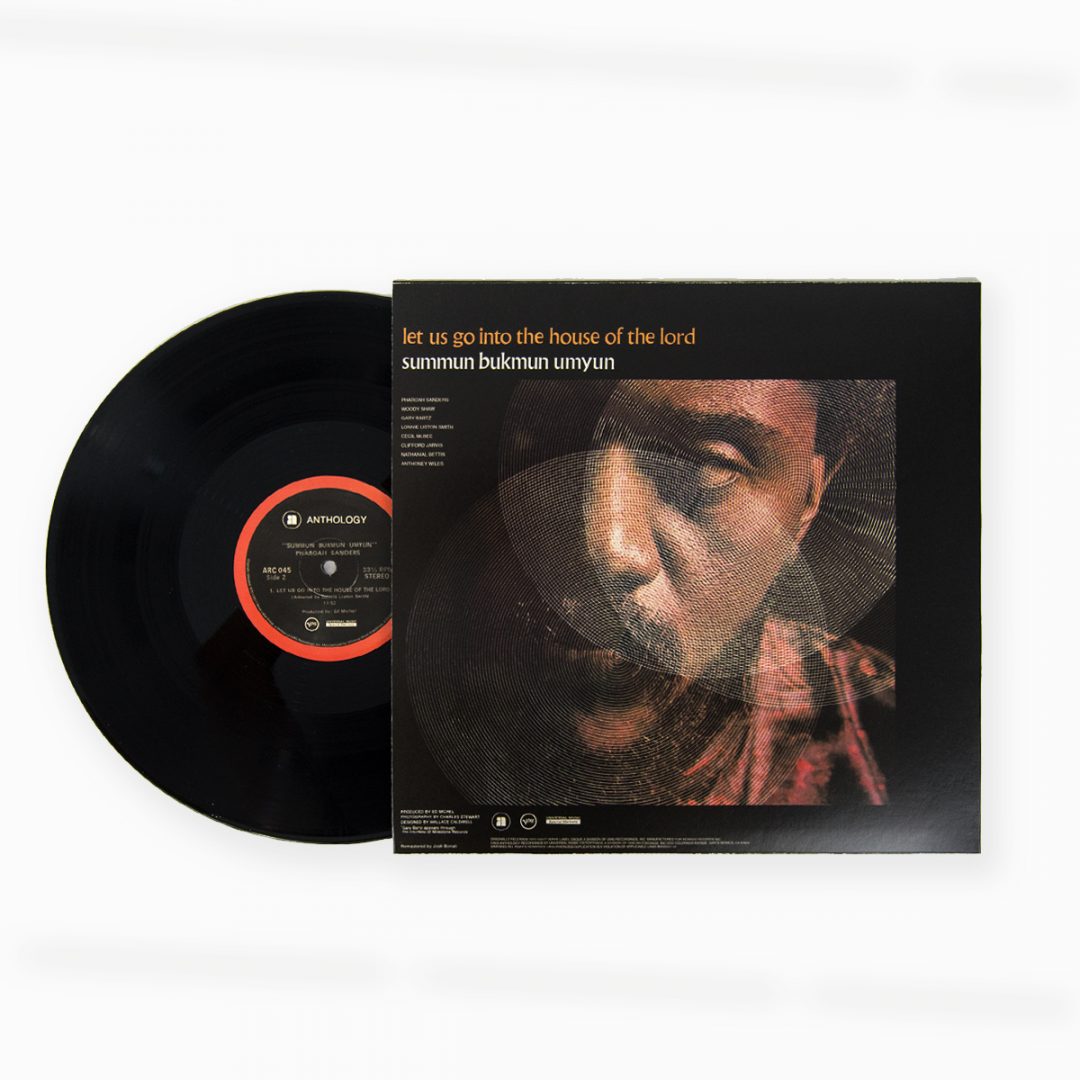Summun, Bukmun, Umyun (Deaf, Dumb, Blind)
“It’s said that spirit exists beyond space or time… This recording was, indeed, a spiritual undertaking.”
dublab’s Mark Maxwell on Pharoah Sanders’ Summun, Bukmun, Umyun (Deaf, Dumb, Blind)
Summun Bukmun Umyun (Deaf Dumb Blind)
It’s said that spirit exists beyond space or time. This may explain why there’s a freshness about the music on Summun Bukmun Umyun – Deaf Dumb Blind that belies its 47 years. This recording was, indeed, a spiritual undertaking.
Pharoah Sanders’ 1966 debut recording for the Impulse label bears the Arabic title Tauhid. This translates to “the oneness of god”, a core concept of Islam. His follow up, Karma, yielded the chart topping composition “The Creator Has A Master Plan”. Jewels Of Thought (Pharoah Sander’s third Impulse LP) featured the standout track “Hum-Allah-Hum-Allah-Hum-Allah”. So Summun Bukmun Umyun falls comfortably into this pattern of spiritual subject matter.
The actual phrase summun bukmun umyun comes from the Koran. It refers to non-believers. That being said, Pharoah’s title choice may have more of a political significance than a spiritual one. The phrase was in popular usage at the time among the followers of Elijah Muhhamad and most likely indicates an affinity for the Nation Of Islam’s black power message.
Pharoah Sanders’ afrocentricity would soon go on to be more unequivocally articulated with recordings such as Live At The East and Black Unity, but on this 4th Impulse recording it seems to exist more as artistic aesthetic than political manifesto.
The album’s title track is rich with the African primacy of rhythm. With the exception of bassist Cecil McBee, the entire octet is involved in contributing a muscular percussion. This polyrhythmic aspect also contains strong melodic and harmonic elements in the form of Nat Bettis’ balafon and Lonnie Liston Smith’s stacatto two chord piano vamp. The resultant groove provides an earthy accessibility that grounds the side long composition even as it propels it. It should be noted that though McBee is not playing a percussion instrument, per se, it’s his deep syncopated bass line that establishes the powerful groove. Two minutes and twenty seconds into this groove we’re treated to the recording debut of Sander’s throaty, ecstatic cry on soprano saxophone. It is a voice full of joyous intensity and vitality. A minute later Gary Bartz’s familiar alto sax enters in the right channel with Woody Shaw’s distinctive trumpet following soon after on the left channel. From this point there is an organic unfolding of saxophone, piano, balafon, drum, flute and whistle solos as well as exuberant melodic vamping that ultimately trail off after the 21 minute mark like a desert caravan breaking camp at dawn.
Producer Ed Michel’s hands-off approach to production proves to be a good fit for an artist of Pharoah’s vision. It allows each of the tunes to progress at their own pace. It also leaves room for non-traditional instrumentation and techniques.
What emerges is natural music in service of a high vibration and this continues – albeit with a different vibration – on the record’s flip side.
Interestingly, that flip side is Smith’s adaptation of a traditional gospel piece.
“I look at all religions and just put them all into one, you know. That’s what I do. It’s like a personal kind of thing. I don’t go to a church or mosque, I’m here every day doing my own thing. But I try and pray all the time. The day’s like one big prayer to me, not at any one time.”
“Let Us Go Into The House Of The Lord” is at times reminiscent of John Coltrane’s “Welcome” from the 1966 Impulse recording Kulu Se Mama. Pharoah appears on that album as well, but not on that particular tune.
From the beginning, the ensemble evokes an atmosphere of deep reverence and devotion. Of course, much of that prayerfulness comes directly from the bell of Pharoah’s horn. He receives adept support from Smith’s majestic piano arpeggios, a plenitude of bells and shakers, and ex-Sun Ra drummer Clifford Jarvis’ ever tasteful tom and cymbal work, but McBee’s masterful arco bass work performs as much heavy lifting as anyone involved. The bassist’s bowed contributions keep the music gently climbing throughout it’s unhurried 17 minute and 46 seconds.
Floating and tranquil the piece meanders languidly yet manages to reach a stunning climax roughly at half way point.
It is not a climax in the common sense. It is hushed and incredibly peaceful. The saxophone quiets, the bells and arpeggios recede. Smith reaches into the piano to strum the strings like a harp. It’s here that the bass emerges from his supporting role with a tender vocal quality that is astonishing to behold. It’s so intimate that you almost feel embarrassed; almost as though you’ve inadvertently eavesdropped on the most private of conversations.
And you have; a conversation with the most high. However, there’s no need for embarrassment.
Stream + Purchase Summun Bukmun Umyun – Deaf Dumb Blind.
Summun, Bukmun, Umyun – Deaf, Dumb, Blind
A1. Summun, Bukmun, Umyun
B1. Let Us Go Into The House Of The Lord
The Deluxe Edition features all three LPs and 16-page zine housed in O-Card hand-assembled and screen-printed by Keegan Cooke.
 Mexican Summer
Mexican Summer 






